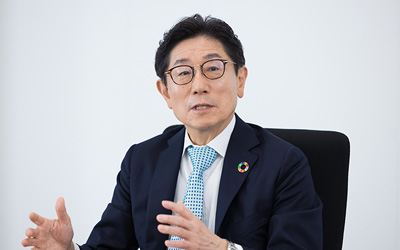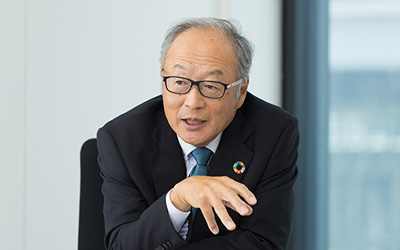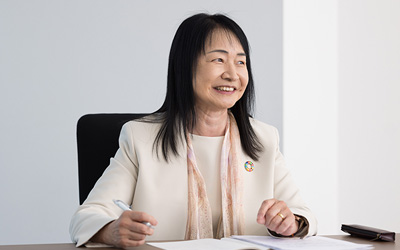Roundtable Discussion with the Outside Directors
Towards the Sustainable Improvement of TAIYO YUDEN's Value
TAIYO YUDEN continues to strengthen its corporate governance structure in an aim to ensure sustainable growth and medium- to long-term improvements in corporate value. Outside Directors Masashi Hiraiwa, Seiichi Koike and Emiko Hamada sat for a discussion about their expectations for the new president, Mr. Sase, human capital, and the initiatives of the Sustainability Committee.
-
Masashi Hiraiwa
Outside Director
-
Emiko Hamada
Outside Director
-
Seiichi Koike
Outside Director
What Will and Will Not Change Under the New Administration
Hiraiwa: In June of this year, a new administration was launched as Mr. Sase was appointed President and Chief Executive Officer ("President"). When I met with Mr. Sase in my capacity as Chair of the Nomination Committee, I felt I could sense his resolve despite his calm tone. In particular, I remember Mr. Sase saying, "I will steadfastly execute the current medium-term management plan" and "My mission is to translate TAIYO YUDEN's management philosophy into reality."
TAIYO YUDEN's three-part management philosophy—employee well-being, betterment of local communities, and responsibility to provide returns to shareholders—overlaps with the SDGs in many ways. The reason Mr. Sase's words impressed me is that they show that he values this management philosophy and wants to move the Company forward in a way that meets the needs of society, and he wants to achieve this with a mindset that is grounded in achieving the targets of the medium-term management plan.

Koike: When I met with him as a candidate for president last fiscal year, I too felt his strong resolve. Since this fiscal year is positioned as a turnaround year in the medium-term management plan 2025 ("medium-term plan"), I look forward to seeing how he manages the changing external environment to achieve the Company's financial and non-financial targets.
Hamada: I think Chairperson Tosaka and President Sase are completely different personality types, but what they have in common is they are both knowledgeable about technology and they both proceed in a meticulous manner. This gives me a sense of security. In that sense, I don't think that TAIYO YUDEN's unique technology-centered approach will change.
On the other hand, because Mr. Sase is relatively young, I think he will be a great inspiration for those who are looking to move up. I hope that this presidential transition means that the Company is entering its next stage. I also hope that this transition will lead to a greater awareness of their own responsibilities of younger generation, and that it will stimulate constructive discussions not only about the current medium-term plan but also about the future.
Discussion on Human Capital to be Held at the Board of Directors Meeting
Hamada: One of the issues to be addressed in the evaluation of the effectiveness of the Board of Directors is "investments in human capital that are linked to the management strategy." I think we need to have another thorough discussion on the management strategy itself so that we avoid the unsophisticated approach of following the trends of the times. The basis of human capital is to determine what quality and quantity of human resources are needed to implement our management strategy, and then invest in securing the necessary people. In addition to in-house training, we need to consider recruiting outside talent and other means to secure the people we need. In that sense, TAIYO YUDEN is still at the earliest stage of the discussion.
Hiraiwa: With regard to management succession planning, although we are building a database of candidates, we are still mostly talking in generalities. I would like to see a bit more systematic management and discussion of succession planning.
Koike: Looking inside the company, we can see that our level-specific training of employees is systematized and rigorous. On the other hand, when it comes to corporate officers, I think there is a lot of room for improvement in our succession planning, as Mr. Hiraiwa mentioned.

Changes Brought About by the Sustainability Committee
Koike: In the past, TAIYO YUDEN regarded economic value and social value as trade-offs and prioritized economic value. However, I have the impression that employee attitudes have changed thanks to the activities of the Sustainability Committee. The idea that focusing on social value is a prerequisite for creating economic value has permeated the Company, and we have seen an evolution across a number of initiatives, including on the environment. As a specific example, in fiscal 2022 we were recognized by CDP, an international environmental non-profit organization, as a top-rated"Climate Change A List" company for our efforts.
Hamada: The Sustainability Committee deals with a wide range of themes, including environmental, safety, and health issues, but it provides a framework for aggregating all of these themes and considering them holistically. In particular, we have achieved steady results over the past year in our environmental initiatives, which have set a lofty goal of reducing GHG emissions on an absolute basis even as production volume increases in response to expanding demand for electronic components. I am beginning to feel that our employees are now firmly committed to sustainability.
Hiraiwa: Speaking theoretically from my perspective as a lawyer, I believe that there is a correlation between our sustainability initiatives and recent changes in thinking regarding the question "Who controls the company?" Originally, the answer to that question was "the shareholders." Later, under the concept of "stakeholders," the idea that companies are controlled not only by shareholders but also by business partners, employees, and others became mainstream. Today, we are entering an era in which society controls the company.
In other words, a company that ignores the demands of society will perish. We are entering an era where corporate value cannot increase unless we heed these demands. In this era, sustainability activities are not something that should be done, but must be done. At TAIYO YUDEN, I think we should promote our sustainability activities with a greater sense that the themes addressed by the Sustainability Committee are becoming a matter of survival for the Company.
Koike: In terms of the relationship between sustainability and management, last year the Remuneration Committee designed a remuneration system that incentivizes sustainability efforts. Officers' bonuses are basically determined according to consolidated net profit, but the system was changed so that they are now multiplied by the level of goal achievement of the officer's organization and the achievement of non-financial (ESG) indicators in the medium-term plan. I will be watching closely to see how this change in incentives yields results.
Towards TAIYO YUDEN's Medium- to Long-Term Value Creation
Koike: TAIYO YUDEN has a history of global expansion as a manufacturing company that leverages its material technology. In other words, our growth up to this point has relied on integrated development from materials to products and repeated innovation in manufacturing. To continue to be a company that is highly regarded around the world, we need to improve the profitability of our existing businesses and create innovation, and to achieve this, human resources will become more important than ever.
Hamada: In recent years, against the backdrop of rapid market expansion, we have been focusing on expanding production capacity. I'm sure this process has been quite taxing on our employees, but our investments progressed smoothly and the scale of the business grew. Furthermore, the Company as a whole has begun to adopt a perspective that not only pursues economic value, but also considers the balance with social value. In that sense, I believe we have laid the groundwork to advance to the next higher stage as a company.

Hiraiwa: I have high expectations that our new president, Mr. Sase, will provide TAIYO YUDEN with leadership not only through the current medium-term plan but also beyond. As both of you mentioned, a sustainable framework is almost in place, and I hope our younger employees will do their best to take it to the next stage.
